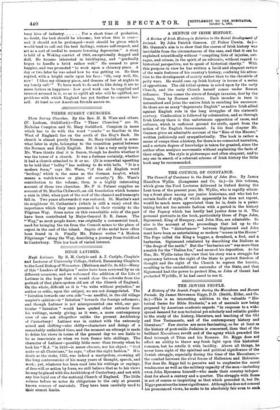HUGH LATIMER.
Hugh Latimer. By R. M. Carlyle and A. J. Carlyle, Chaplain and Lecturer of University College, Oxford, Examining Chaplain to the Lord Bishop of Worcester. (Methuen and Co. 8s. 6d.)—Many of this "Leaders of Religion" series have been reviewed by us on different occasions, and we welcomed the addition of the Life of Latimer in the hope that it would clear the cobwebs from the portrait of that plain-spoken old son of the Church of England. On the whole, difficult as it is "to write without prejudice," as author or critic, upon the subject, we are not disappointed. The " fairation towards our own side "—so needful, in the old village umpire's opinion—is " fairation " towards the foreign reformers ; and though Latimer is not misrepresented one whit, our par- ticular " fairation " would have quoted other extracts from his writings, merely giving, as it were, a more contemporary view of one not altogether unlike the present Archbishop of Canterbury ! Latimer was in contact with the extremely mixed and shifting—also shifty—characters and doings of a remarkably unfinished time, and the moment an attempt is made to define his views in terms of the present day we are liable to be as inaccurate as when we turn francs into shillings. The character of Latimer—possibly little more than twenty when be took his "B.A. "in 1510—is never obscure, nor his object : "God make us all Christians," he says, "after the right fashion." His death at the stake, 1555, was indeed a martyrdom, crowning all the long controversies of his many years of thought, speech, and work ; yet, whatever has been read into his writings or sayings, of free-will or action by force, we still believe that as to his views he may be placed with the Archbishop of Canterbury, and not with any less loyal son of the national Church of England. The little volume before us notes its obligations to the only at present known sources of materials. They have been carefully used to their utmost limits.


















































 Previous page
Previous page